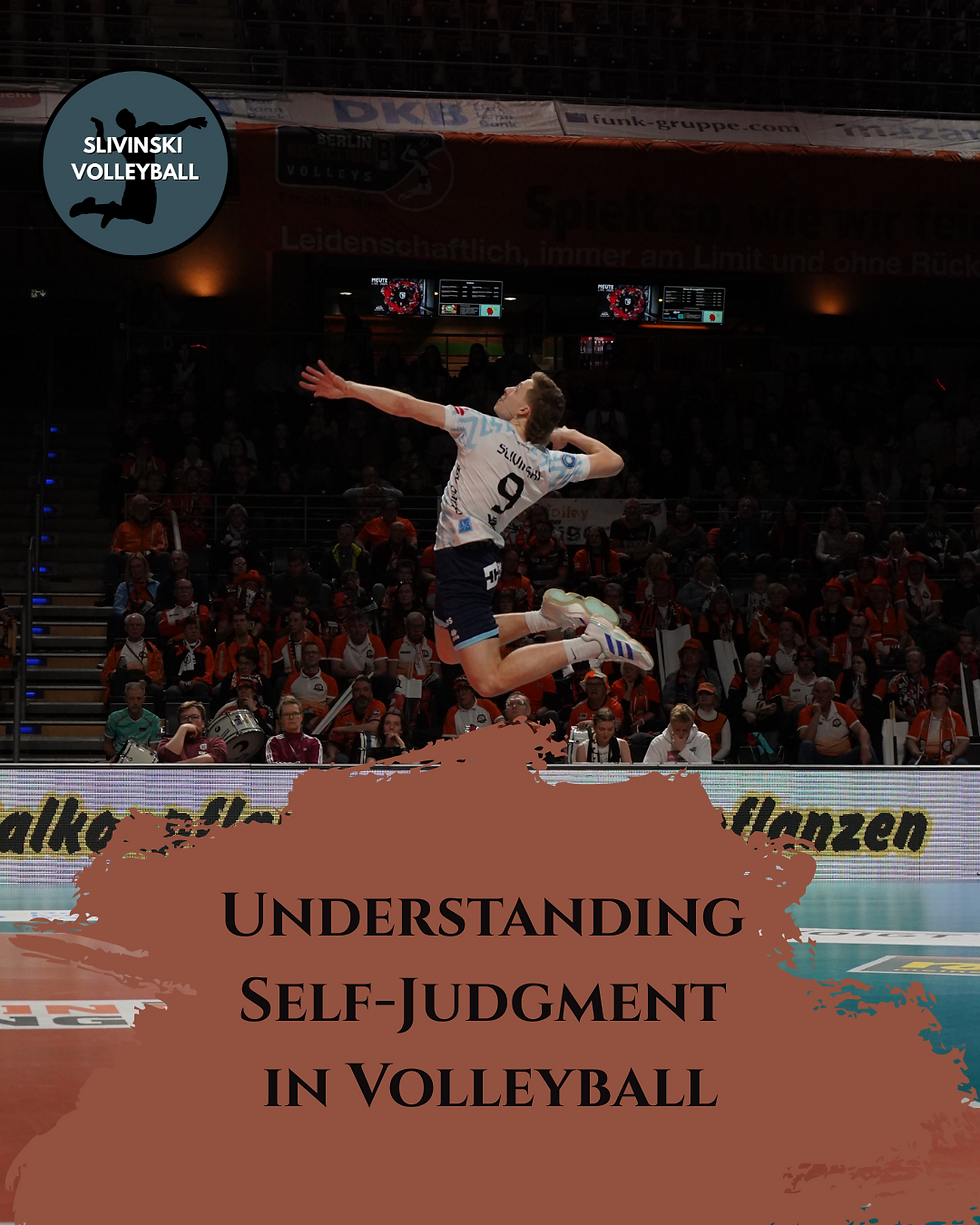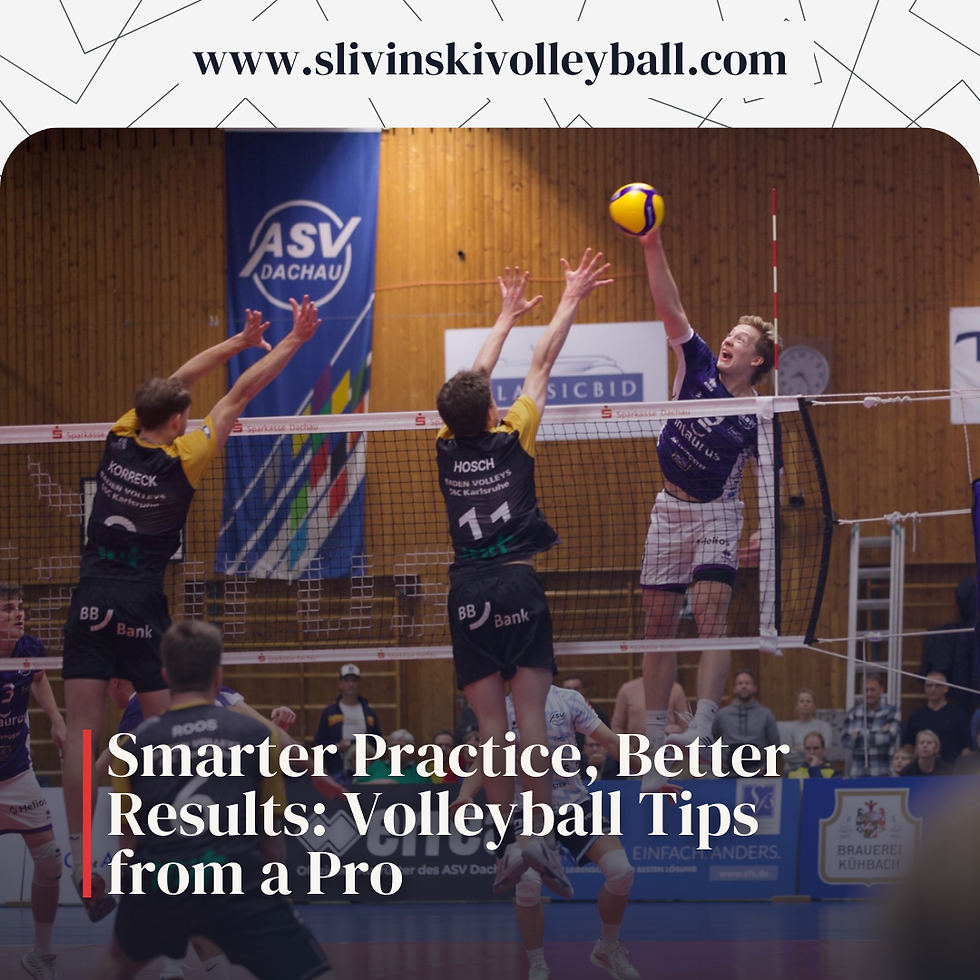How I Judge My Performance as a Professional Volleyball Athlete in a Positive Manner
- Matt Slivinski

- Mar 31
- 4 min read

Understanding Self-Judgment in Volleyball
It has taken me a long time to fully understand how to judge my own performance as an athlete. The way we evaluate ourselves can set us apart from other athletes, whether it’s during team tryouts, USA Volleyball evaluations, or college recruitment. Learning the proper way to assess your own game can not only improve your personal performance but also positively impact your teammates.
Volleyball is a game of mistakes. The sooner you accept that, the sooner you’ll be able to treat each point individually rather than letting past plays affect future ones. It’s natural to want to avoid errors, but eliminating them entirely is impossible. Instead, we should learn how to evaluate our performances in a way that fosters growth and confidence rather than frustration and negativity.
Control vs. Out of Control: Focusing on What Matters
Volleyball is a game of inches. A ball that barely misses the line or a serve that clips the top of the net can shape your mindset for an entire day, week, or even longer. In a sport where success or failure is often determined by the smallest margins, it’s essential to judge yourself based only on what you can control.
Take serving, for example. You can control:
Your toss
The intent behind your serve (power, placement, spin)
Your mechanics and technique
However, once the ball leaves your hand, you can’t control whether it barely misses the line or skims the net and bounces back. If you could, you’d be one of the best players in the world!
For example, when I miss a serve by hitting the top of the tape, it’s easy to feel like I’ve made a terrible mistake. But in reality, if that serve had been one inch higher, it might have been an ace. So why should I get upset about something outside my control? The moment the ball leaves my hand, its fate is sealed. The best I can do is focus on the aspects I can control—like my toss, footwork, and hand contact—and make adjustments moving forward.
I’ve learned to judge myself based on fixed factors, not variable ones. I evaluate my intent, not just the outcome. When I miss a serve, I break it down:
Was my toss high and into the court?
Did I broad jump too much?
Was my hand contact clean?
Was my intent valid for the situation?
The easy reaction to a mistake is frustration, but ask yourself: Why?
Is this the last serve you’ll ever serve? The last game or practice you’ll ever play? No! So why let a single mistake ruin your mindset when:
Your intent was to execute the serve correctly.
You’re human, and mistakes are part of the game.
You have more opportunities to serve.
If you can understand this, there’s no logical reason to let negative emotions take over during training or competition.
The Power of Positivity: A Mental Reset
Let’s step away from volleyball for a moment. Imagine you’re driving on the highway, and someone suddenly cuts you off. That action is out of your control. Now, you have two options:
You get angry, yell, maybe even honk your horn aggressively.
You acknowledge the situation but stay calm and keep driving.
The first option only distracts you from your goal of reaching your destination safely. The second option allows you to stay focused and in control.
The same logic applies to volleyball. If you dwell on errors, you’re only hurting yourself. But if you stay composed and focus on what you can control, you give yourself the best chance to succeed. Great players get knocked down all the time, but they get back up—every single time—with the intent to learn and improve.
Process Over Results: A New Perspective
Many athletes have heard the phrase Process Over Results. At Carthage College, I had at least five practice shirts with that saying on the back. Initially, I believed it meant that if I worked hard in practice, the weight room, and extra reps, my results would reflect that effort.
It seemed simple: work harder, get better, win.
But over time, I realized that process and results aren’t always connected. How many of you have put in more work than a teammate or opponent, only to see them outperform you anyway? Maybe you arrive early, stay late, and put up 100 extra reps every day—yet that other player still gets better results.
This can be frustrating, but it doesn’t mean your process is wrong. If we prioritize process over results, but we judge ourselves by results, we create a mental conflict. Our mind prioritizes process, yet we measure success through outcomes. This can lead to overworking, burnout, and self-doubt.
Intent Over Results: A More Effective Mindset
So, if judging ourselves by results isn’t productive, and if working harder and harder doesn’t always lead to success, how should we evaluate ourselves? The answer is simple: Judge yourself by your intent.
Let’s say I get blocked. What’s next? The block happened—I can’t change that now. The only productive response is to reset and move on. If I let the result dictate my emotions, negativity will creep in and affect my future plays. But if I judge myself based on my intent, I can focus on executing my next play with a clear mind.
That doesn’t mean I never get frustrated. The times I do get upset with myself are when I don’t follow through on my intent. For example, if I signal to my team that I’m blocking cross but then instinctively block line instead—leading to a cross-court kill—that is a moment where I should hold myself accountable. That mistake was completely within my control, and I need to correct it.
This is why I’ve shifted from Process Over Results to Intent Over Results. By focusing on intent, I limit my self-judgment to the things I can control, allowing positivity to flourish.
Final Takeaways
Here’s what I’ve learned:
Positivity can solve many of the mental struggles young athletes face.
Self-judgment should be based only on controllable aspects of the game.
Intent Over Results is a more effective mindset than Process Over Results.
By shifting the way we evaluate our performances, we can create a more productive and confident approach to volleyball. Focus on what you can control, let go of what you can’t, and always play with intent. That’s the key to long-term success.



Comments